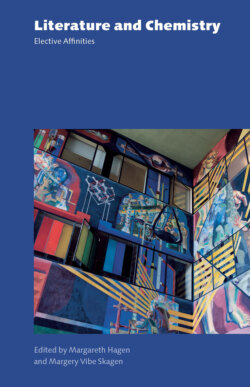Читать книгу Literature and Chemistry - Группа авторов - Страница 26
На сайте Литреса книга снята с продажи.
THE CHEMISTRY OF WRITING
ОглавлениеReading Levi’s book with expectations about the autobiographical genre, one might be confused and perhaps also astonished by the distance the narrator imposes between himself and his audience. There is always a filter, or a veil, of objectivity, such that the general laws of nature and the profound ethical issues seem to conceal the particular nature of the individual life. “The Periodic Table might be the least lyrical autobiography of Italian modern literature”, writes the Italian critic Eraldo Affinati. He continues: “Once again the writer keeps himself at a safe distance by screening in science his conceptual inheritance. The objectivity of the narrative is so strong that it risks consuming the underlying sentiments” (Affinati, p. 429; my translation).
Levi explained several times how being a chemist helped him to achieve an extraordinary mindfulness of material reality, to explore the potentiality of the senses, and to extract metaphors that could be used as tools for analysing and describing the world. The tools of the literary trade accompany the tools of chemistry, Levi writes in the essay “Ex-Chemist”: “I write precisely because I am a chemist: my old trade has been largely transfused into my new one” (Other People’s Trades, p. 176). Émile Zola, in the preface to Thérèse Raquin, also compares his work to that of a scientist. The author, he says, combines temperaments or characters, introducing them to circumstances which work as catalysts for provoking specific reactions.4 In Levi’s case, however, the literary use of chemistry is always somehow connected to his own life, and he often uses his own experiences as raw material. This is how he describes the relationship between his writing and chemistry:
[…] writing is a way of “producing”, indeed a process of transformation: the writer transforms his experiences into a form that is accessible and attractive to the “customer” who will be the reader. The experiences (in the broad sense: life experiences) are therefore raw material: the writer who lacks them works in a void … Now, the things I have seen, experienced, and done during my preceding incarnation are today for me as writer a precious source of raw materials, of events to narrate, and not only events. Also of those fundamental emotions which are one’s way of measuring oneself against matter … and thus winning and losing. This last is a painful but salutary experience without which one does not become adult and responsible. (Other People’s Trades, p. 175)
I would like to draw attention to three statements in this dense paragraph. Firstly, Levi emphasises that the very profession – or trade – of chemistry is a tool for personal formation, almost in the German sense of Bildung. Secondly, in comparing the practices of writing and chemistry, he points not only to life experiences as the writer’s raw material, but also to emotions. Coming from an author who seldom includes explicit descriptions of emotions, this seems to be an important, and somewhat surprising, statement.
Thirdly, in this passage he compares the process of writing to synthetic chemistry, the formation or building of complex compounds, the creation of new chemicals. Levi considers himself a synthetic chemist, a rigger-chemist: his speciality is paint. “We are divided into two branches”, he explains in the novel The Monkey’s Wrench, “those who rig and those who dismantle or break down” (The Monkey’s Wrench, p. 142, 145). But the methods of analytical chemistry underlie all chemical construction. In fact, in the short essay “Ex-Chemist”, Levi also compares writing to analytical chemistry:
Chemistry is the art of separating, weighing and distinguishing: these are three useful exercises also for the person who sets out to describe events or give body to his own imagination. Moreover, there is an immense inherited wealth of metaphors that the writer can take from the chemistry of today and yesterday, which those who have not frequented the laboratory and factory know only approximately. The laymen knows what to filter, crystallise, and distil mean (…) but he does not know the emotions that are tied to these gestures, has not perceived the symbolic shadow they cast. (“Ex-Chemist”, pp. 175-6; emphasis added)5
Again, Levi stresses the chemist’s emotional involvement. His description of the ethos and formation of the chemist is based on the daily work and struggle in the laboratory, the testing and failing, and the constant training of the senses, but fundamentally also on the symbolic shadow of the elements, which is connected to their ancient and cultural history.6
But the chemist’s knowledge of the elements of our world is, in Levi’s case, in addition transformed into a profound hylozoic Weltanschauung, as Cesare Cases defines it, where the animate and inanimate are tightly linked together and the elements have human connotations. “The overflowing hylozoism is the soul of this remarkable autobiography, where the epic struggle with the Hyle marks the stages of a life of fighting” (Cases, p. 12). Hylozoism is the philosophical theory that all matter is endowed with life, and Levi goes on to add human qualities and ethos to his elements. I cannot see any reason for objecting to the idea of hylozoism in Levi, but I do believe it is worth questioning if this world view could be described as an intrinsic part of the philosophy, or better, the style of chemistry. In one of her recent essays Bernadette Bensaude-Vincent has described how chemistry deals with materials rather than matter, with relations rather than substances, and that the chemist’s style of reasoning about the world is representing nature as a theatre of transformation (“The Chemists’ Style of Thinking”).
Keeping in mind Levi’s poetic use of chemistry, the emotional memories of the chemist’s craft, and how the work of the author can be seen as parallel to processes of chemical analysis and chemical synthesis, I now turn my attention to the structure of The Periodic Table, Levi’s unique autobiography.
